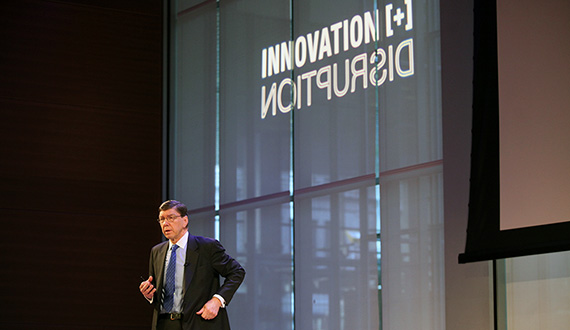Clayton Christensen kicked off Colgate University’s Innovation + Disruption symposium today with cautionary tales of industry giants felled by technological disruption, and why higher education should pay attention to the growth of online universities.
Christensen, the Kim B. Clark Professor of Business Administration at the Harvard Business School, and co-founder of Innosight, was invited to the symposium by Colgate President Jeffrey Herbst to lead a discussion about technological disruption for a crowd of higher education leaders at the TimesCenter in New York City.
“There’s much talk now about online education, as a fundamental — perhaps existential — threat to brick-and-mortar schools,” Herbst said. “Never has it been more clear that an education designed for a lifetime is critical.”
MORE
Christensen’s talk, “The Innovative University,” explained why he is worried about the future of higher education in a world where online learning technologies are catering to entirely new populations of students on a scale of hundreds of thousands.
“In the industries where disruption has occurred, there has been a technological core of some sort,” Christensen said. “In computing, the technological core was the processor. In the steel industry, it was the furnace itself… That’s why higher education has historically not been disrupted. We haven’t had a technological driver.”
Much like how steel companies were disrupted by upstarts with new furnace technology and a laser focus on the most inexpensive segment of the steel market (rebar), online education has created an inexpensive alternative to brick- and-mortar schools in a market that is rarely a consideration for leading universities, he said.

Clayton Christensen speaks Monday at the Innovation + Disruption symposium. (Photo by Lorenzo Ciniglio)
“Disruption makes it so much more affordable and accessible that whole new populations have access to it,” Christensen said.
Christensen explained how online courses have the ability to offer lectures with slick editing, music, animations, and picturesque settings. They also have created networking opportunities with other participants, thanks to social media. But Christensen believes there may be one important aspect they have yet to attain.
“What’s the substance of conversation when our alumni come back? What was it that changed them? Almost inevitably, it was a professor that changed their lives,” Christensen said.
Visit colgate.edu/innovationdisruption to watch Christensen’s talk and a panel discussion with six university presidents, titled “Seizing the Initiative in the Digital Age,” moderated by Jeffrey Fager ’77, CBS News chairman. Also available are lectures by Karen Harpp, Colgate associate professor of geology, and Erland Stevens, professor and chair of chemistry, Davidson College.
Join the discussion on Twitter with the hashtag #innovationdisruption.
